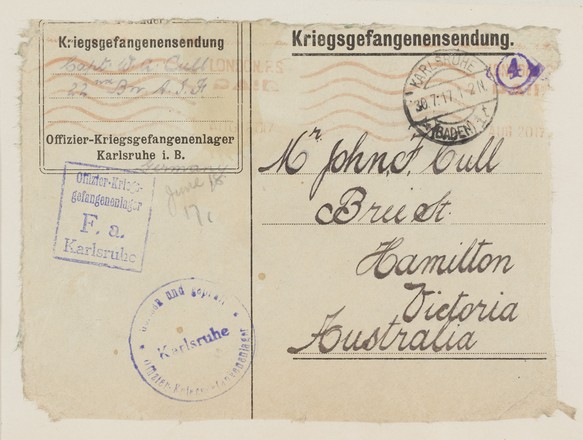
William Ambrose Cull letter diary, 1915–1918
Cull letter diary, 1915-‐1918 / Capt. William Ambrose Cull, MLMSS 1165
Manuscript

Cull letter diary, 1915-‐1918 / Capt. William Ambrose Cull, MLMSS 1165
Manuscript
Once released from camp, Cull underwent many medical treatments in Switzerland. In February 1918, he suffered a total breakdown of health: ‘I was a complete nervous breakdown. No sleep, couldn’t read or write.’
Cull was initially reported wounded and missing in action in February 1917. This information was then updated to read: ‘Prisoner of war in Germany, wounded in abdomen and hip’.
Cull was 24 when he was discharged from the AIF. He was permanently disabled due to the massive injuries to his hip.
Cull spent four and a half months in hospital due to the severity of his wounds. In total he spent thirteen months imprisoned in Germany.
Cull was a representative on the Victorian Repatriation Commission and became interested in state politics. He made a run for office as a Nationalist candidate for the seat of Albert Park but lost to the Labor representative.
Cull was housed in officer camps in Karlsruhe, Freiburg and Heidelberg. As an officer, he lived under better conditions than the other ranks of prisoners.
Cull’s health continued to be compromised as a result of his experiences in war, and on 20 August 1939, at the age of 44, he suffered a massive heart attack as he stood to respond to a toast at his mother’s eightieth birthday party. He was buried in Coburg cemetery in Melbourne.
Unlike other ranks, officers were not forced to work in Prison Camps.
Sick or wounded prisoners unable to resume fighting were candidates for exchange and moved to neutral countries. In January 1918, Cull was transferred to Montreux, Switzerland, on a prisoner exchange.